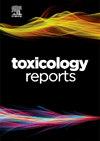In silico, in vitro and in vivo toxicity assessment of the antitumoral peptide GK-1
Q1 Environmental Science
引用次数: 0
Abstract
Peptide drugs have emerged as an attractive alternative for cancer treatment due to their potency, high specificity, general safety and low cost. GK-1 is a linear 18 amino acid peptide with proven immunomodulator, antitumor and antimetastatic capacity in animal models. Preclinical toxicity studies for its use as a vaccine adjuvant demonstrated its safety in various assay systems, but a comprehensive exploration of its toxicity profile is required to be used in cancer immunotherapy. Therefore, in the present work, the potential toxicity of GK-1 was predicted with ToxinPred 3.0 software, and its in vitro cytotoxicity, and single-dose and repeated-dose toxicity by subcutaneous route in mice were experimentally assessed. GK-1 peptide was predicted as a non-toxic and did not exhibit in vitro cytotoxicity for several non-tumor and tumor cell lines and primary cell cultures at concentrations up to 500 µM, reinforcing previous studies pointing that the antitumoral effect of GK-1 was not mediated by tumor cell cytotoxicity. The single-dose toxicity study did not evidence local or systemic toxicity up to the maximum tested dose of 1000 mg/kg. Moreover, no toxic effects were observed in the repeated-dose toxicity study based on four doses administered weekly at up to 300 mg/kg. Considering that GK-1 is effective in triple-negative breast cancer and melanoma models in mice at doses as low as 5 mg/kg, the present results support the safety of GK-1 as an antitumoral peptide candidate.
硅片上,抗肿瘤肽GK-1的体内外毒性评价
多肽药物因其效力强、特异性高、安全性好、成本低等特点,已成为一种有吸引力的癌症治疗方法。GK-1是一种线性18氨基酸肽,在动物模型中具有免疫调节剂、抗肿瘤和抗转移能力。临床前毒性研究表明其作为疫苗佐剂在各种检测系统中是安全的,但需要对其毒性进行全面的探索才能用于癌症免疫治疗。因此,本研究采用ToxinPred 3.0软件预测GK-1的潜在毒性,并对其体外细胞毒性、小鼠皮下给药单次和重复给药毒性进行实验评估。在浓度高达500 µM时,预测GK-1肽对几种非肿瘤和肿瘤细胞系以及原代细胞培养物无毒且不表现出体外细胞毒性,这加强了先前研究指出的GK-1的抗肿瘤作用不是由肿瘤细胞毒性介导的。单剂量毒性研究未发现最大试验剂量为1000 mg/kg的局部或全身毒性。此外,在每周给药4次,最高300 mg/kg的重复给药毒性研究中未观察到毒性作用。考虑到GK-1在低至5 mg/kg的剂量下对小鼠三阴性乳腺癌和黑色素瘤模型有效,本研究结果支持GK-1作为抗肿瘤候选肽的安全性。
本文章由计算机程序翻译,如有差异,请以英文原文为准。
求助全文
约1分钟内获得全文
求助全文
来源期刊

Toxicology Reports
Environmental Science-Health, Toxicology and Mutagenesis
CiteScore
7.60
自引率
0.00%
发文量
228
审稿时长
11 weeks
 求助内容:
求助内容: 应助结果提醒方式:
应助结果提醒方式:


